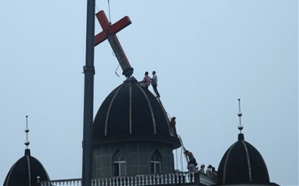
Texas-based nonprofit group China Aid Association has released a report on Tuesday, indicating that persecution against Christians in China has increased significantly from the Chinese government.
The report, entitled "Religious and Human Rights Persecution in China," focused on religious persecution and human rights abuses carried out by the Chinese government in 2014. Rachel Ritchie released some of its statistics within a press release.
"Religious persecution and human rights abuse by the Chinese government against its citizens has risen 152.74 percent since 2013 based on six specific categories of persecution," Ritchie wrote. "In 2014, China Aid documented 572 cases of persecution in which 17,884 religious practitioners were persecuted, representing a 300 percent increase since 2013."
According to Ritchie, the six categories included "the total number of persecution cases, the number of religious practitioners persecuted, the number of citizens detained, the number of citizens sentenced, the number of severe abuse cases and the number of individuals in severe abuses cases." In addition, the number of citizens sentenced for their Christian faith "increased from 12 in 2013 to 1,274 in 2014."
"A number of factors led to the increase, including intense persecution in Zhejiang province as a result of the Chinese government-sanctioned 'Three Rectifications and One Demolition' campaign," Ritchie wrote. "In reality, the campaign indiscriminately removed and demolished crosses on church buildings and, in many cases, demolished the entire church building, regardless of whether the building had been previously approved by the Chinese government."
Ritchie reported that this persecution campaign in China has been carried out both on house churches and Three-Self Patriotic Movement (TSPM) churches, which have officially registered with the Chinese government. She thought that some of the persecution could be attributed to "political reforms" instituted by China President Xi, which were meant to tackle corruption within the country.
"In response to the growth of Christianity in China, the Chinese government has instituted various campaigns to persecute both house churches and government-sanctioned TSPM churches throughout China by harassing, abusing, arresting, and, in many cases, sentencing pastors and church members to prison," Ritchie wrote.
In addition to Christians being targeted, Ritchie claimed that the government has also used the "political reforms" to persecute "religious communities, non-governmental organizations, human rights lawyers, and other religious and political so-called 'dissenters.'" However, some religious communities in China have begun to stand up for themselves, citing the rule of law.
"Although there is an escalation of persecution in China, religious communities are increasingly utilizing the rule of law to defend their rights in administrative proceedings and exposing ongoing abuse and the denial of religious freedom and related human rights via social media," Ritchie wrote.
In its report, China Aid expressed that the trend could continue for some time, adding that "all aspects of Chinese society will continue to be subjected to increased suppression, including the denial of religious freedom and related human rights." However, the organization contended that the latest round of "government-sponsored persecution" will pass, citing a passage from Exodus.
"You shall not bow down to them or worship them; for I, the Lord your God, am a jealous God, punishing the children for the sin of the parents to the third and fourth generation of those who hate me, but showing love to a thousand generations of those who love me and keep my commandments" (Exodus 20:5-6).






